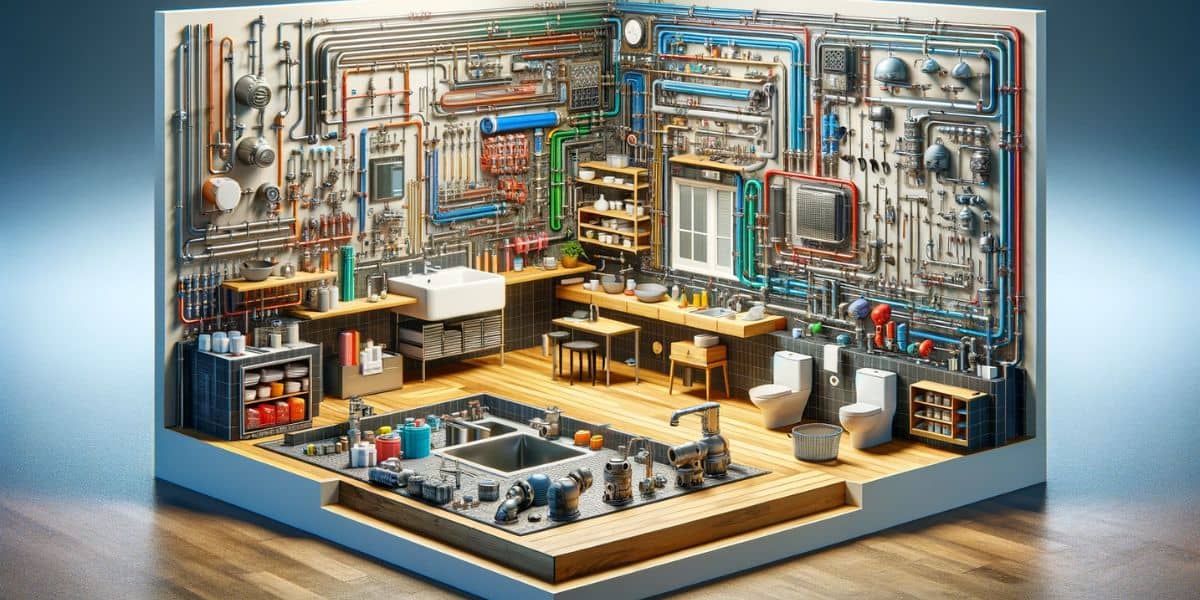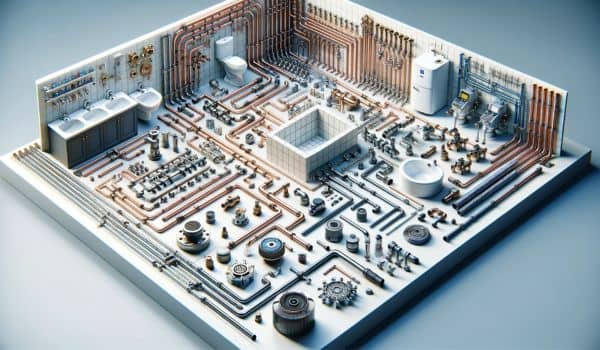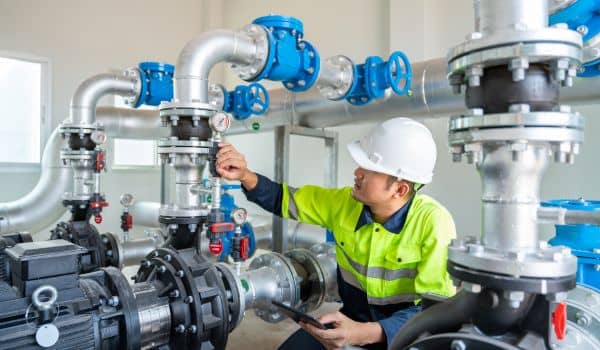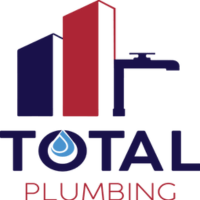How to Estimate Plumbing Costs for New Construction
Written by Total Plumbing Team
Published:
New construction projects bring excitement and the promise of a dream home, but they also bring the challenge of managing costs effectively.
One area that often catches homeowners off guard is plumbing expenses.
Imagine this: you’re overseeing the construction of your dream house, and suddenly, plumbing costs spiral out of control.
However, estimating the cost of plumbing for new construction can be daunting, filled with numerous variables and uncertainties.
This article aims to demystify the process and offer a comprehensive guide to accurately estimating these costs, ensuring your project stays on budget and meets all requirements.

Understanding the Basics of a Plumbing System
When it comes to new construction, having a solid grasp of the basic plumbing system is essential.
This includes understanding the network of pipes, fixtures, and other residential or commercial plumbing system components.
These systems are designed to supply water, drain waste, and sometimes include heating elements.
Being familiar with these basics will give you a better footing when discussing plans with a contractor or evaluating plumbing cost estimates.
Identifying the Plumbing Needs for New Construction
 Each new construction project is unique, and so are its plumbing needs. Determining these needs early on is essential.
Each new construction project is unique, and so are its plumbing needs. Determining these needs early on is essential.
Consider factors like the number of plumbing fixtures like sinks, toilets, kitchens, and showers, as well as understanding the requirements for special systems such as underfloor heating or solar water heating.
Identifying these needs early on is key to accurately estimating your construction costs.
Key Factors Influencing Plumbing Costs
 Several factors can significantly impact the cost of plumbing in new construction. These include:
Several factors can significantly impact the cost of plumbing in new construction. These include:
Size of the Building
The size of the building directly impacts the amount of plumbing material (like pipes and fittings) and labor required. Larger buildings will generally incur higher construction costs.
Number of Plumbing Fixtures
The number of fixtures – including sinks, toilets, and showers – also plays a significant role in determining the cost.
More fixtures mean more materials and more work, which adds to the plumbing cost.
Type of Plumbing Materials
Choosing between different plumbing instruments like PVC, copper pipes, or PEX can affect both the durability and cost of your plumbing.
Each material has its pros and cons, and prices vary considerably.
Complexity of the Plumbing System:
The more complex your plumbing system, with features like water filtration systems or luxury fixtures, the higher the cost to install or replace plumbing will be.
Labor Costs
Labor costs can vary based on the region, the complexity of the work, and the plumber’s experience level.
It’s a significant part of your overall plumbing cost.
Location of the Property
The geographical location of your property can influence the cost. Different areas have varying rates for materials and labor.
How to Estimate Plumbing Costs for New Construction : Step-by-Step Guide

Acquire a Detailed Blueprint
Start by getting a detailed blueprint of your plumbing system. This should include the layout of pipes, fixtures, and any special plumbing features.
A comprehensive blueprint helps in getting a more accurate cost estimate.
Material Costs
Calculate the average costs, considering the type of pipes (like PVC, copper pipe, or PEX), fixtures, fittings, and other necessary plumbing components.
Prices can vary depending on the type and quality of materials used. So, doing thorough research or consulting with a professional plumber is important.
Labor Estimates
Labor costs can be estimated by multiplying the number of hours expected to complete the job by the local hourly rate for plumbers.
Remember to factor in the job’s complexity, which can increase labor hours.
Additional Expenses
Always factor in additional expenses, such as permits, inspections, or unexpected repairs. These can impact the total cost of your plumbing project.
Get Professional Consultation
Consult with a professional plumbing contractor or a construction estimator. They can provide insights and help you understand the average cost per square foot or per fixture.
For more detailed calculations, consider using a plumbing cost estimate tool.
Utilize Smart Plumbing Technology

While the initial investment might be higher, these technologies often pay for themselves over time through efficiency and conservation.
Tips for Saving on New Construction Costs

- Invest in Quality Where It Counts: Quality matters, especially in plumbing work. Investing in high-quality Piping Materials and fixtures can save you from future repair costs.
- Compare Prices and Seek Discounts: Shop for the best plumbing materials deals. Don’t hesitate to negotiate with suppliers and contractors.
- Plan Efficiently: A well-thought-out plan can reduce wastage and optimize material and labor costs.
- Regular Maintenance: Proper plumbing system maintenance can prevent expensive repairs down the line.
Common Pitfalls to Avoid

- Not understanding the full scope of your plumbing project.
- Ignoring local regulations and building codes.
- Failing to set aside a budget for unexpected expenses.
- Compromising on material quality for cost savings.
- Not getting multiple quotes for the new construction plumbing.
How do you find a reliable plumbing contractor for new construction?

- Check for Licensing and Insurance: Ensure the contractor is licensed and insured to protect against liability and substandard work.
- Look for Experience: Experience in new construction plumbing is crucial.
- Seek References: Ask for and check references to gauge their reliability and quality of work.
- Get Detailed Quotes: Detailed quotes can help avoid unexpected costs later.
- Evaluate Communication Skills: Good communication is key to ensuring your needs and expectations are clearly understood and met.
- Compare Bids: Don’t just look at the price. Consider the scope of work, materials proposed, and the contractor’s reputation.
- Ask About Guarantees: A reliable contractor will stand behind their work with guarantees or warranties.
Conclusion
Estimating plumbing costs for new construction requires careful planning, understanding the factors that influence costs, and working with experienced professionals.
By following the guidelines outlined in this blog, you can manage your plumbing expenses effectively and ensure successful completion of your Construction management.
Frequently Asked Questions
How Do You Calculate Labor Costs for Plumbing?
Calculating labor costs involves a straightforward formula: estimated hours of work multiplied by the hourly rate of a plumber. It’s essential to account for the job’s complexity, as intricate plumbing work might need more time and specialized skills, increasing the cost.
Can I Reduce Costs by Doing Some Plumbing Work Myself?
While DIY can seem like a cost-saving option, weighing the risks is important; plumbing involves technical skills and code adherence.
Any errors can lead to serious plumbing issues, like water damage, which could cost more in the long run.
Hiring a professional is usually safer and more cost-effective in the long term, especially for a new construction project.
How Much Should I Budget for Unexpected Expenses?
A good rule of thumb is to allocate an additional 10-15% of your estimated plumbing costs for unexpected expenses.
This buffer can cover any surprises or changes during the plumbing installation process.
Is It Necessary to Hire a Professional Plumber for New Construction?
Absolutely. Professional plumbers bring expertise and knowledge of building codes and the latest plumbing technologies to your project.
Their skills ensure that your new plumbing system is installed correctly, functions efficiently, and complies with all legal requirements.
Total Plumbing Content Team
Total Plumbing Solutions content team offers useful tips and guidance on plumbing information.
Our writers specialize in plumbing and craft straightforward content covering safety, installation, repairs, and more.
Our aim? Make your plumbing work safe and easy at home or on the job.

